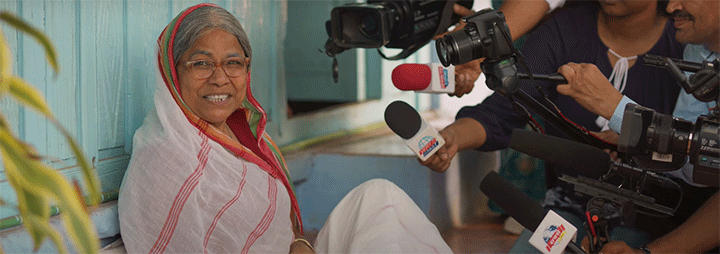Sir Madam Sarpanch Movie Review: Loose screenplay hampers a good narrative
Sir Madam Sarpanch review: The film is based on actual events where a young medical student contested the election and became her ancestral village’s Sarpanch. Here, the story follows Ana (Ariana Sajnani), who wants to open a library in Badgaon, Madhya Pradesh, to honour her late father’s last wish. The opening sequence has a mobile junkie grandmother (Seema Biswas) bickering with her granddaughter and daughter-in-law and sets the tone for a kooky village saga with oddball characters. Soon, Ana comes to live with them and takes on a local politician, Bhaiyyaji (Bhagwan Tiwari), who has illegally occupied her father’s house, where she wants to open the library. What follows is her strife to realise her father’s dream.
Sir Madam Sarpanch shows promise initially as Ana struggles to bring her noble cause to fruition. The local officials’ ridiculous demands are in cahoots with Bhaiyyaji and prevent her from succeeding, with ridiculous demands to get 10-odd NOCs. But the story turns on its head as Ana finds an easier way — to contest the election for the post of Sarpanch so that she can right the wrongs in the village. After that, the narrative loses its charm and seems unconvincing with Bhaiyyaji’s shenanigans of election publicity.
Praveen Morchhale’s direction is decent, but it would have helped to have a better script and screenplay. Cinematographer Mohammad Reza captures the rural world well, whether inside the characters’ homes or in the bylanes. Sahil Kulkarni’s opening track is melodic and gives a good start to the movie.
Seema Biswas delivers a power-packed performance as the lively and irreverent Amma. While Bhagwan Tiwari is impressive in his part menacing and part comical turn (most scenes with his three stooges elicit laughter), Ariana Sajnani is passable in her role. However, her American accent lends authenticity to her character.
The film captures the current scenario with references to ‘New India,’ trillion economy, America being a bully, history in textbooks being revised, caste and communal politics, crowd-funding, social media, etc. But they do little to take the story forward, and once the focus shifts to elections, these fizzle out. The viewer is treated to interesting thoughts and dialogues between the characters until the story is about the library. A school principal asks Ana to get the NOC from the architectural department to open the library because some books are powerful enough to shake governments, and the poorly-constructed building couldn’t bear their weight.
The movie is entertaining in parts, and if you like simple stories set in villages, this one may appeal to you.
For all the latest entertainment News Click Here


